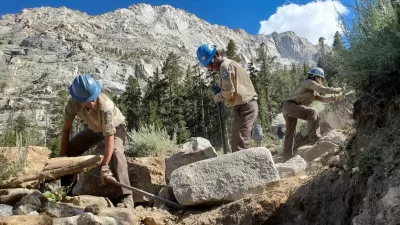A new federal initiative places young workers in jobs aimed at building climate resilience, but will it avoid the mistakes of similar programs?

A new federal program titled the American Climate Corps (ACC) models itself on the Depression-era Civilian Conservation Corps (CCC), which created tens of thousands of jobs and built thousands of small and large infrastructure projects around the country.
The ACC will focus on climate resilience, explains Brooke Larsen in High Country News. “The jobs they do will vary, from wildland firefighters and “lawn busters” to urban farm fellows and traditional ecological knowledge stewards. Some will work on food security or energy conservation in cities, while others will tackle invasive species and stream restoration on public land.” The positions available are generally staffed through state and local non-profits that partner with federal agencies. “In New Mexico, for example, members of Conservation Legacy’s Ecological Monitoring Crew will help the Bureau of Land Management collect soil and vegetation data.”
Larsen notes that “AmeriCorps and conservation corps programs have been criticized for offering low wages and few benefits” and excluding people of color and low-income communities. “While the administration aims for all positions to pay at least $15 an hour, the lowest-paid position in the West is currently listed at $11 an hour. Benefits also vary widely, though most include an education benefit, and, in some cases, health care, child care and housing.”
FULL STORY: The American Climate Corps take flight, with most jobs based in the West

Planetizen Federal Action Tracker
A weekly monitor of how Trump’s orders and actions are impacting planners and planning in America.

Congressman Proposes Bill to Rename DC Metro “Trump Train”
The Make Autorail Great Again Act would withhold federal funding to the system until the Washington Metropolitan Area Transit Authority (WMATA), rebrands as the Washington Metropolitan Authority for Greater Access (WMAGA).

The Simple Legislative Tool Transforming Vacant Downtowns
In California, Michigan and Georgia, an easy win is bringing dollars — and delight — back to city centers.

The States Losing Rural Delivery Rooms at an Alarming Pace
In some states, as few as 9% of rural hospitals still deliver babies. As a result, rising pre-term births, no adequate pre-term care and harrowing close calls are a growing reality.

The Small South Asian Republic Going all in on EVs
Thanks to one simple policy change less than five years ago, 65% of new cars in this Himalayan country are now electric.

DC Backpedals on Bike Lane Protection, Swaps Barriers for Paint
Citing aesthetic concerns, the city is removing the concrete barriers and flexposts that once separated Arizona Avenue cyclists from motor vehicles.
Urban Design for Planners 1: Software Tools
This six-course series explores essential urban design concepts using open source software and equips planners with the tools they need to participate fully in the urban design process.
Planning for Universal Design
Learn the tools for implementing Universal Design in planning regulations.
Smith Gee Studio
City of Charlotte
City of Camden Redevelopment Agency
City of Astoria
Transportation Research & Education Center (TREC) at Portland State University
US High Speed Rail Association
City of Camden Redevelopment Agency
Municipality of Princeton (NJ)





























